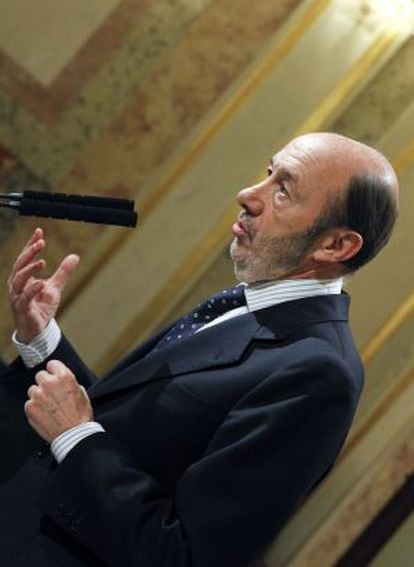Socialist leader augurs “broad” anti-austerity pact with government
Rajoy and Rubalcaba agree there is a change of direction in favor of growth at the heart of the EU

With winds of change blowing in Brussels in favor of a new continent-wide strategy to tackle unemployment and ignite growth, the Popular Party (PP) and opposition Socialists (PSOE) have made a preliminary agreement to form a common front next month to urge the European Commission to push for stimulus packages to help Spain’s economy get rolling again.
Socialist leader Alfredo Pérez Rubalcaba reiterated on Thursday that his party and the PP were on the “verge of coming up with a broad [political] pact” to present a united front before the European Commission (EC) when EU leaders meet in Brussels at the end of June to discuss a package of recommendations on stability, growth and jobs designed for 23 countries and how nations will work to incorporate them into their national budgets and economic reform plans.
“There are perspectives on the horizon to work together that the PSOE will not reject because Europe is changing and Spain needs to take advantage to ensure that it is included in those changes,” Rubalcaba told reporters in Congress.
Those changes, according to Spanish government officials, appear to be centered on looking for ways to promote growth in nations that have been badly affected by the euro-zone recession and putting together programs that will train and help young people find work, especially in Spain where youth unemployment hit 57 percent at the end of March.
The PSOE will not reject a deal because Europe is changing and Spain needs to take advantage"
After years of warnings by economists and political leaders outside the European realm that austerity alone won’t help the world’s biggest trading bloc get back on its feet, this new path taken by Brussels is a 180-degree policy turn from EU leaders’ stubborn demands that national governments and the people must accept the pain from enforced cutbacks, mostly in social and welfare programs.
During a news conference he held jointly with Austrian President Werner Faymann, Rajoy on Wednesday acknowledged that the EU was ready to change the course of its policies. “The European message has changed. I attended my first European Council in 2012, and all that was discussed then was austerity. Today we are talking about SMEs [small and midsized enterprises] and jobs for young people,” he said.
On Wednesday, Spain was given another two years to bring its budget deficit within the EU ceiling of three percent of GDP. Brussels set the goal for this year at 6.5 percent of GDP — the initial target was 4.5 percent — which is even greater than the 6.3 percent the PP government had asked for. The overspend targets for 2014 and 2015 are 5.8 and 4.2 percent, respectively.
Positive signs that European leaders were ready to help Spain tackle its unemployment problem also surfaced on May 21 when Germany signed an agreement with Labor Minister Fátima Báñez to help fund and oversee a combination work training program in which young Spaniards will be given vocational instruction while provided with a job.
The importance of a pact is not a pact per se. The importance is what it contains"
Alfonso Alonso, the PP spokesman in Congress, confirmed on Thursday that his party was willing to work with the Socialists to “go to battle” with the EC when leaders meet from June 27 to 28. “We are still working things out and we will look for an agreement in parliament among groups who are willing to show their face at the Council in June. There was an offer yesterday by Alfredo Pérez Rubalcaba. He extended his hand and we took it, and we are going to work to ensure that it happens,” Alonso said.
Seen as a political buoy for Rajoy, Rubalcaba’s offer comes at a critical time for the prime minister who found himself the butt of severe criticism lodged by his former mentor, ex-Prime Minister José María Aznar, who last week during a television interview attacked the current PP leader for his economic policies. At the same time, Rajoy angered his party barons — the PP regional leaders — as they failed to reach an agreement on Monday over more flexible terms to meeting their own administrations’ deficit targets.
But there are some inside the PP who appear to object to the Socialists' offer. María Dolores de Cospedal, the number two in the party and regional premier in Castilla-La Mancha, said the offer was “excessively vague.”
“The importance of a pact is not a pact per se. The importance is what it contains, and in my opinion, as of today, what the Socialists have presented is excessively vague,” she said.










































